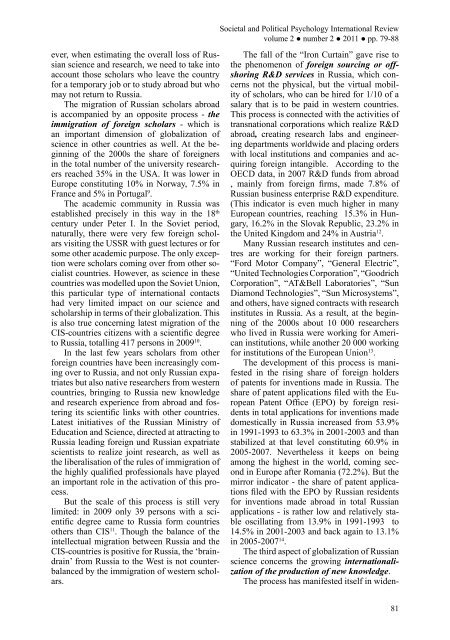State, community, individual - Societal and Political Psychology ...
State, community, individual - Societal and Political Psychology ...
State, community, individual - Societal and Political Psychology ...
Create successful ePaper yourself
Turn your PDF publications into a flip-book with our unique Google optimized e-Paper software.
ever, when estimating the overall loss of Russian<br />
science <strong>and</strong> research, we need to take into<br />
account those scholars who leave the country<br />
for a temporary job or to study abroad but who<br />
may not return to Russia.<br />
The migration of Russian scholars abroad<br />
is accompanied by an opposite process - the<br />
immigration of foreign scholars - which is<br />
an important dimension of globalization of<br />
science in other countries as well. At the beginning<br />
of the 2000s the share of foreigners<br />
in the total number of the university researchers<br />
reached 35% in the USA. It was lower in<br />
Europe constituting 10% in Norway, 7.5% in<br />
France <strong>and</strong> 5% in Portugal 9 .<br />
The academic <strong>community</strong> in Russia was<br />
established precisely in this way in the 18 th<br />
century under Peter I. In the Soviet period,<br />
naturally, there were very few foreign scholars<br />
visiting the USSR with guest lectures or for<br />
some other academic purpose. The only exception<br />
were scholars coming over from other socialist<br />
countries. However, as science in these<br />
countries was modelled upon the Soviet Union,<br />
this particular type of international contacts<br />
had very limited impact on our science <strong>and</strong><br />
scholarship in terms of their globalization. This<br />
is also true concerning latest migration of the<br />
CIS-countries citizens with a scientifi c degree<br />
to Russia, totalling 417 persons in 2009 10 .<br />
In the last few years scholars from other<br />
foreign countries have been increasingly coming<br />
over to Russia, <strong>and</strong> not only Russian expatriates<br />
but also native researchers from western<br />
countries, bringing to Russia new knowledge<br />
<strong>and</strong> research experience from abroad <strong>and</strong> fostering<br />
its scientifi c links with other countries.<br />
Latest initiatives of the Russian Ministry of<br />
Education <strong>and</strong> Science, directed at attracting to<br />
Russia leading foreign und Russian expatriate<br />
scientists to realize joint research, as well as<br />
the liberalisation of the rules of immigration of<br />
the highly qualifi ed professionals have played<br />
an important role in the activation of this process.<br />
But the scale of this process is still very<br />
limited: in 2009 only 39 persons with a scientifi<br />
c degree came to Russia form countries<br />
others than CIS 11 . Though the balance of the<br />
intellectual migration between Russia <strong>and</strong> the<br />
CIS-countries is positive for Russia, the ‘braindrain’<br />
from Russia to the West is not counterbalanced<br />
by the immigration of western scholars.<br />
<strong>Societal</strong> <strong>and</strong> <strong>Political</strong> <strong>Psychology</strong> International Review<br />
volume 2 ● number 2 ● 2011 ● pp. 79-88<br />
The fall of the “Iron Curtain” gave rise to<br />
the phenomenon of foreign sourcing or offshoring<br />
R&D services in Russia, which concerns<br />
not the physical, but the virtual mobility<br />
of scholars, who can be hired for 1/10 of a<br />
salary that is to be paid in western countries.<br />
This process is connected with the activities of<br />
transnational corporations which realize R&D<br />
abroad, creating research labs <strong>and</strong> engineering<br />
departments worldwide <strong>and</strong> placing orders<br />
with local institutions <strong>and</strong> companies <strong>and</strong> acquiring<br />
foreign intangible. According to the<br />
OECD data, in 2007 R&D funds from abroad<br />
, mainly from foreign fi rms, made 7.8% of<br />
Russian business enterprise R&D expenditure.<br />
(This indicator is even much higher in many<br />
European countries, reaching 15.3% in Hungary,<br />
16.2% in the Slovak Republic, 23.2% in<br />
the United Kingdom <strong>and</strong> 24% in Austria 12 .<br />
Many Russian research institutes <strong>and</strong> centres<br />
are working for their foreign partners.<br />
“Ford Motor Company”, “General Electric”,<br />
“United Technologies Corporation”, “Goodrich<br />
Corporation”, “AT&Bell Laboratories”, “Sun<br />
Diamond Technologies”, “Sun Microsystems”,<br />
<strong>and</strong> others, have signed contracts with research<br />
institutes in Russia. As a result, at the beginning<br />
of the 2000s about 10 000 researchers<br />
who lived in Russia were working for American<br />
institutions, while another 20 000 working<br />
for institutions of the European Union 13 .<br />
The development of this process is manifested<br />
in the rising share of foreign holders<br />
of patents for inventions made in Russia. The<br />
share of patent applications fi led with the European<br />
Patent Offi ce (EPO) by foreign residents<br />
in total applications for inventions made<br />
domestically in Russia increased from 53.9%<br />
in 1991-1993 to 63.3% in 2001-2003 <strong>and</strong> than<br />
stabilized at that level constituting 60.9% in<br />
2005-2007. Nevertheless it keeps on being<br />
among the highest in the world, coming second<br />
in Europe after Romania (72.2%). But the<br />
mirror indicator - the share of patent applications<br />
fi led with the EPO by Russian residents<br />
for inventions made abroad in total Russian<br />
applications - is rather low <strong>and</strong> relatively stable<br />
oscillating from 13.9% in 1991-1993 to<br />
14.5% in 2001-2003 <strong>and</strong> back again to 13.1%<br />
in 2005-2007 14 .<br />
The third aspect of globalization of Russian<br />
science concerns the growing internationalization<br />
of the production of new knowledge.<br />
The process has manifested itself in widen-<br />
81


